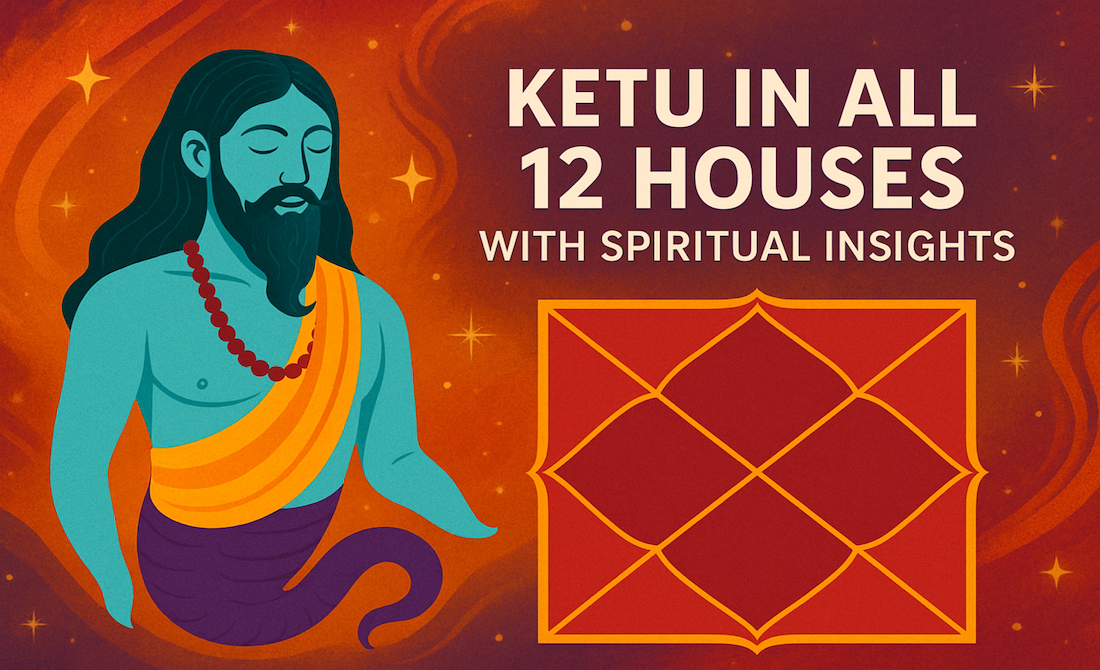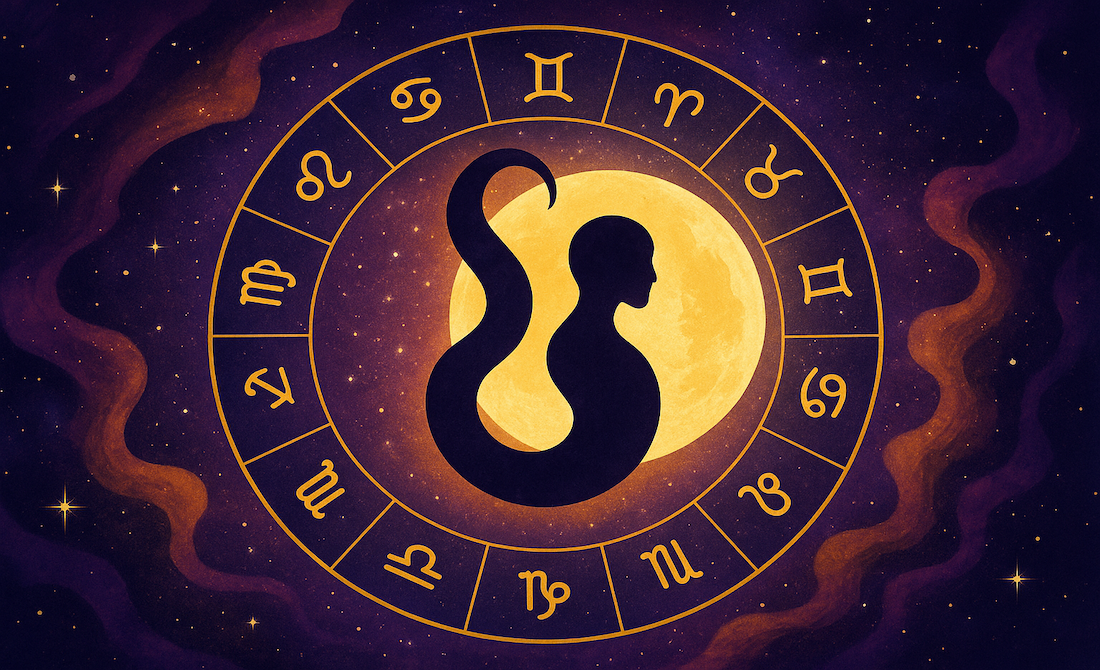Letting Go and Emptiness
You all should understand that letting go is the way of Ketu, the way of the Buddhas. When Ketu is in a specific house, he has gone beyond the matters related to that house. No matter what you do, the house he is placed in brings nil results, Shunyata, emptiness. The house opposite to Ketu gets activated and fired up, because Rahu is on the other end.
Overview of Ketu in All 12 Houses
I will be sharing just a small overview of Ketu in all 12 houses:
Ketu in the First House
When Ketu is in the first house, the focus is on the other, the partner—it can be your marriage partner or your live-in partner. Self-realization becomes difficult because the native’s whole obsession is with the other. They know a lot, but true knowing is missing. They become scholars, but they can never become Buddha unless they stop focusing on others and start focusing on the self.
Ketu in the Second House
The focus shifts to hidden secrets, depths and all sorts of supernatural sciences—black magic, witchcraft, hypnosis or past-life regressions. If the horoscope has a strong quality, the person might even become a skilled surgeon. It all depends on the exact Rahu8 position.
Ketu in the Third House
Here the emphasis is on religion, higher education, in-laws and publications. Wherever Ketu Maharaj sits, there is absolutely nothing to be expected, while Rahu—on the opposite side—magnifies desire. Third-house Ketu makes one more religious and more keen on higher education, but ultimately directs focus to the ninth house.
Ketu in the Fourth House
The career becomes the obsession. Men and women with this placement will do anything to reach the top. With Rahu in the tenth house, they cannot sit quietly; meditation is very difficult. Even as CEOs, they remain restless, always sensing something more to attain.
Ketu in the Fifth House
Attention turns to networking, social life and benefits from friend circles. Fifth-house Ketu brings out a highly extrovert nature and a drive to become public.
Ketu in the Sixth House
Focus falls on the unseen: monasteries, actions behind the scenes, spirituality, yoga and meditation. This is why sages call it the most beneficial position. Ketu dispels conflicts and open enemies. The only downside is health—Ketu6 often brings chronic issues like diabetes or high blood pressure. Opposite, Rahu in the twelfth house intensifies interest in the supernatural or, if well-placed, blesses one’s meditation and yoga practice.
Ketu in the Seventh House
The partner again takes center stage, but from a different angle: natives keep their partner on the “back seat.” Rahu in the first house makes one obsess over their body. Too much focus—on self or other—is always a potential source of conflict.
Ketu in the Eighth House
Here the fixation is on family, money and building fortunes. Rahu in the second house breeds greed—outsiders see no interest in wealth, while inside desire boils. Family bonds also grow intense.
Ketu in the Ninth House
Communication, expression and siblings become the arenas of restlessness. With Rahu in the third house, that restlessness can fuel entrepreneurship or daring ventures—ideal for today’s startup culture, if other aspects support it.
Ketu in the Tenth House
Attention shifts to home, mother, properties and material happiness. Rahu in the fourth house creates a “mommy’s boy” dynamic—strong maternal bonds can spark conflict in marriage.
Ketu in the Eleventh House
Learning and romance are paramount—without these, life feels empty. Eleventh-house Ketu brings Rahu in the fifth, leading to cycles of relationships and artistic passions: poetry, painting, dance.
Ketu in the Twelfth House
Daily routines, jobs and public service call. Such people often thrive in politics or fitness professions, focused on defeating enemies. Nehru had Rahu6–Ketu12, for example.
The Seesaw Metaphor
Have you seen a seesaw? If you sit on one end and a child on the other, you go down and the child rises up. Ketu always remains on the ground—nobody—while Rahu blooms. Ketu is Shunya, zero. One minus zero is one. Zero never changes the result.
Emptiness and Nothingness
Best and worst apply to those who have something to give. Ketu has nothing to give or take. In nothingness lies everything. “The ending is a beginning,” says Jiddu Krishnamurti.
The Master’s Teaching
A young man said, “I’ve lost everything—what now?” The master replied, “Restart with faith that all will be well. As long as there are buts and ifs, you remain stuck. The past is gone; now is your present. Life is neither past nor future—it is now. Get back to work. It is never too late.”
Forgotten Language and Silence
Jesus said, “You don’t understand now what I’m doing, but one day you will.” Rahu-bound minds condemn silence and meditation. A man once asked, “What is this forgotten language?” It is the language of silence—where truth, God and love dwell. Real communication happens in silence; knowledge is noisy.
Detachment and Meditation
Expectations breed frustration. Cut ties with past and future; live in the present, and your life becomes a song, a dance. Ketu is innocent, agenda-free. Frustration with Ketu stems from obsession with sex, money, power, lust and greed. When Ketu dasha or a transit challenges Rahu’s grip, you feel lost. Become detached. Be like the elephant in the marketplace: dogs may bark, but the elephant never reacts.
Master–Disciple Relationship
Arjuna’s exile was no issue—he did not cling. Krishna commanded, and Arjuna followed. The master–disciple bond is the highest love: John and Jesus; Sariputta and Buddha; Arjuna and Krishna; Chuang Tzu and Lao Tzu.
Call to Meditation
To understand Ketu, walk his path—inward. Meditate morning and evening for at least one hour. While the world turns on, focus on turning in. Ramana Maharshi says, “Give up outward thoughts, fix your mind in the Self, and the Self alone will remain.” To realize the Self, pass through no-mind via Ketu. Without it, you remain in Rahu’s misery.
Be Here Now
This moment is all you have. Live without regretting the past or fearing the future. Love brings you fully into the now. Lovers fail; love never fails. Born of love, we meditate with devotion and surrender to witness the miracle of inner transformation. Are you ready? If you wish to go deeper, read my book Why Ketu Can Heal. And always remember: you are not alone.



